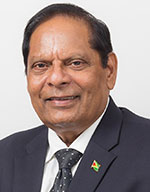WITH neither the government nor the Guyana Teacher’s Union closing the door to talks tomorrow, when the new school term begins, could mark a new phase in industrial relations should a full-blown strike by teachers be averted. It does not appear, from statements made by President David Granger as well as union leaders Mark Lyte and Coretta McDonald, that a confrontation is looming.
However, there are dissident forces that have been stirring strife, hoping that a strike by the estimated 10,000 teachers in Guyana would not only shut schools, but would shake and sabotage confidence in the coalition government.
As the academic year starts tomorrow, children who are now starting school will be looking towards a new life-long experience of meeting their teachers, and settling down in their classrooms, which is why the decision by teachers whether or not to be there for these children would be an agonising one. It is in the best interest of the children that contingency arrangements be put in place to ensure their safety, and not allow opportunistic elements to hijack the teachers’ cause for mischief.
LIFE-TIME BURDEN
While teachers have carried seemingly a life-time burden to educate our Guyanese generations and their fresh off-spring, there is a consensus that they have not been given adequate benefits for doing so. This would be true also for nurses and state security ranks. This runs counter to the principle, more applicable in land matters, that he who runs with the burden, should take (or reject) the benefit.
No one can doubt that for many years public servants, including teachers, have been owed a “wage debt”, as the renowned Guyana-born economist, Dr Clive Thomas, once described it. In post-independent Guyana, public servants invariably carried the burden of structural adjustments, wage restraints, austerity programmes and deferred entitlements. Those collectively had formed the underlying reasons for what had appeared to be a permanent “five percent” syndrome, which must be brought to an end in this new era when Guyana looks forward to oil wealth.
Predictably, the opposition leader has blurted out that the coalition government has money to give teachers a big salary hike. But it was under his stewardship as Finance Minister that a stiff back was given to demands for decent salary increases. His standard diktat was: “5%; no negotiation; no arbitration.”
His inflexible, dogmatic, anti-working class position resulted in a lengthy strike in the public service. While he had rejected my advocacy for a 12% interim payout in 1999, which could have ended the strike, he readily embraced the Armstrong Arbitration recommendations of 20% for 1999 and 30% for 2000. By then, Janet Jagan had handed the presidency over to him.
POLITICAL OPPORTUNISM
Today, smelling fresh blood to feed his political opportunism, he is resorting to mischief that the coalition government had helped itself to a hefty salary increase at the expense of teachers. But the facts are indisputable that between 1998 and 2014, while salaries for public servants increased by 164.72%, the pay of PPP Ministers went up by 220.5%. The salary of the then President increased by 386.5%.
His political sidekick Mr Anil Nandlall, in a media letter published yesterday, repeated much of what his handler has said about the 50% salary increase for coalition government ministers. The opposition has peddled and spread this 50% distortion that it now appears like the dreaded foot and mouth disease.
The truth is that in 2015 there was no across-the-board 50% salary increase to government ministers. Nor has there been a cent increase since then, and over the past three years!
The increase in 2015 was a one-off adjustment to the pay mostly of junior and senior ministers, numbering under two dozen officials, and the fixing of salary for three first-time vice-presidents. The salary of junior ministers was adjusted to the level of a permanent secretary; and that of senior ministers to the level of a government adviser. The salary of the prime minister was adjusted upwards to be on par with that of the attorney general, who continues to receive a tax-free package.
MINISTERIAL BUREAUCRACY
The salary of the ministerial bureaucracy has been subjected to periodic adjustments over many years. In 1992, the prime minister was getting just over $28,000. In comparison, the attorney general was taking home $78,000. By 2015, when the coalition took office, the salary of the prime minister was $1,549,000 and the attorney general to $1,630,000 (tax-free). Over that period the president’s salary went up by some 500%!
Those huge increases were doled out by the Jagdeo regime, not the coalition government. And there were no tears for teachers!
At that time, selected persons were catapulted to sinecure political advisory positions and, like fat cats at GPL, Guysuco and at the e-Governance project, they were getting multi-millions in salaries.
Since November, 2011, when I first entered the National Assembly as an AFC “opposition” parliamentarian, we called for national concord on the wages issue. We had specifically called for an across-the-board, 10% salary increase to teachers as we recognised their critical role in nation-building.
The expectations that, that would happen since 2011 did not materialise, and after seven years it cannot be said that the demands for a wage adjustment is not justifiable, except that it should be reasonable and within the ability of government to pay, at least at this time. The government had set up a task force to examine a comprehensive approach towards improving the conditions and incentives for teachers but, as President Granger explained, their findings were deficient. Instead of leaving teachers empty-handed, government placed some $900 million on the table.
BETTER OFFER
The GTU has said that it is open to a better offer, which suggests that the search for a mutually satisfactory solution has not ended. It makes sense to leave all options open. On its part, it may be useful for government to look closer at other non-salary issues such as clothing allowances which, if addressed and monetised, could come close to a percentage payout that would far exceed the cursed 5% straitjacket that this government had inherited.
Teachers cannot allow themselves to fall for the silly strife of the political opposition that they would not get bigger salaries unless the government “dismantles the policy which allows ministers to take spouses on overseas trips at the expense of taxpayers.” While I am not aware that there is any such policy, this seems puerile and a vendetta against ministers who have spouses.
The classical wisdom has been captured in the proverb, “those in glass houses should not throw stones.” But old people would advise that those without stones should keep away from glass houses.




.png)









